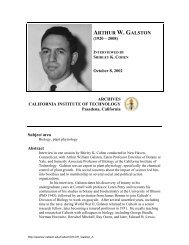Interview with Thomas A. Tombrello - Caltech Oral Histories
Interview with Thomas A. Tombrello - Caltech Oral Histories
Interview with Thomas A. Tombrello - Caltech Oral Histories
You also want an ePaper? Increase the reach of your titles
YUMPU automatically turns print PDFs into web optimized ePapers that Google loves.
<strong>Tombrello</strong>–131<br />
DuBridge interpreted the job offer, I thought, incorrectly, and being a brash young person, I told<br />
him I thought he was interpreting it incorrectly. He said, “This is the Nixon administration’s<br />
recognition of the things I’ve done in science.” I said, “Well, I think that’s true. But at the same<br />
time you’ve got to figure out if you could work <strong>with</strong> this president. Your success will depend on<br />
whether the president talks to you.” Because when presidents talk to their science advisors,<br />
wonderful things happen, and when they don’t talk to the science advisor, nothing happens. And<br />
in the case of DuBridge, Nixon didn’t in fact talk to him. There was a period, I think, when the<br />
country really didn’t have a science advisor, after DuBridge sort of gave up on it.<br />
But then an interesting thing occurred. We had to replace DuBridge. There was a search<br />
committee—Bob Sharp ran it. Insiders have a hard time being promoted to president, just like<br />
outsiders have a hard time being made division chairs or provost. You know every bad thing that<br />
this presidential candidate has done. Some of them are not bad things, but they’ve made<br />
enemies. Anybody who has been or done anything in the administration of a school has had to<br />
make hard choices, and on one side of a hard choice is an unhappy person. You know where all<br />
those bodies are buried if the person comes from, say, <strong>with</strong>in <strong>Caltech</strong>. If they come from outside<br />
<strong>Caltech</strong>, there are bodies at some other institution, but you don’t know about them, or not enough<br />
about them. So Bacher was not likely to be considered seriously.<br />
ASPATURIAN: Was he interested in the job?<br />
TOMBRELLO: Hard to say. Probably, but I can’t prove that. The committee went through a<br />
whole series of people. The only insider who had a chance was Bob Sharp himself, and I gather<br />
his wife was not at all interested in that. Bob would have been a very interesting president.<br />
They went through a list and got nowhere. Then one of the trustees—I don’t know which one—<br />
said, “There’s this young guy in his early forties, secretary of the air force, named Harold Brown.<br />
Give you a choice, you guys. You find somebody. We’ll look at them seriously. But you won’t<br />
find anybody. It’s Harold Brown.” OK. Christy got very much involved at that point and<br />
brought in a number of people. Presidents of other universities. Credible, credible scientists.<br />
Guy Stever [Guyford Stever, then president of Carnegie Mellon]. James Fletcher—the NASA<br />
administrator under Nixon. Both had been students here. William O. Baker, vice president for<br />
research at Bell Labs.<br />
http://resolver.caltech.edu/<strong>Caltech</strong>OH:OH_<strong>Tombrello</strong>_T

















